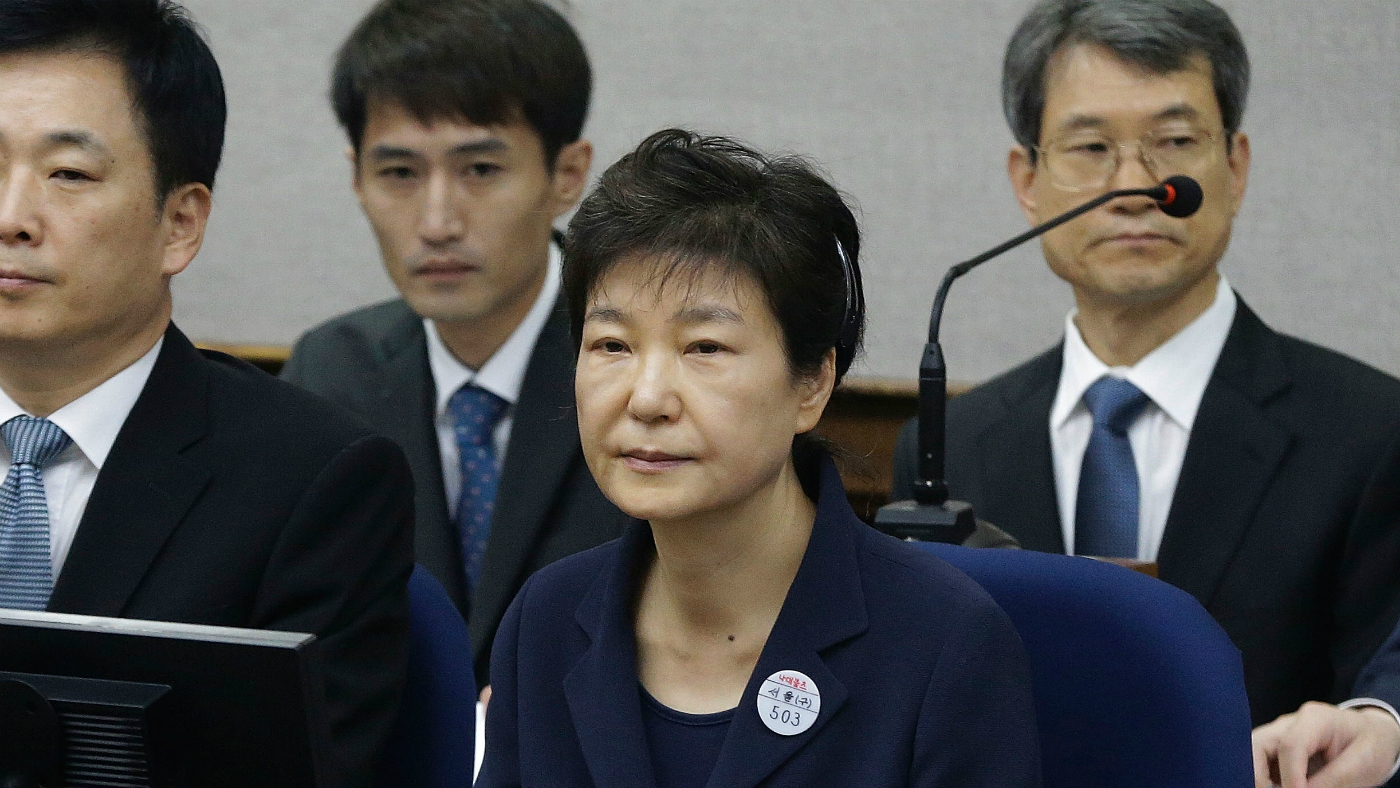Former South Korea president Park Geun-hye jailed for 24 years
Nation’s first female leader found guilty of abuse of power and coercion

A free daily email with the biggest news stories of the day – and the best features from TheWeek.com
You are now subscribed
Your newsletter sign-up was successful
South Korea’s former president Park Geun-hye was sentenced to 24 years in prison today after being found guilty of multiple counts of abuse of power, bribery and coercion.
The verdict, broadcast live on South Korean television, represents “the culmination of a scandal which rocked the country, fuelling rage against political and business elites”, the BBC reports.
Park, 66, was alleged to have colluded with a friend, Choi Soon-sil, and a former presidential aide, in pressuring businesses to donate to two foundations set up to back her policy initiatives.
The Week
Escape your echo chamber. Get the facts behind the news, plus analysis from multiple perspectives.

Sign up for The Week's Free Newsletters
From our morning news briefing to a weekly Good News Newsletter, get the best of The Week delivered directly to your inbox.
From our morning news briefing to a weekly Good News Newsletter, get the best of The Week delivered directly to your inbox.
She was also accused of soliciting bribes from the head of the Samsung Group for government favours.
Handing down the sentence at Seoul Central District Court, the judge said that Park had “abused the power which was given to her by the citizens”. The former president, South Korea’s first female leader, was also fined 18bn won (£12m).
The daughter of dictator Park Chung-hee - assassinated in 1979 - Park held office from 2013 until March 2017, when she was stripped of her powers after the country’s Constitutional Court upheld a parliamentary vote to impeach her. She was arrested weeks later.
Park, who has been held at a detention centre since her arrest, was not present in court for today’s verdict. She has one week to appeal the decision.
A free daily email with the biggest news stories of the day – and the best features from TheWeek.com
The scandal “exposed what has long been widely suspected in South Korea: the entangled web of government and sprawling business conglomerates that dominate the country’s economy”, say The Guardian. “While personally damaging to South Korea’s first female leader, the corruption scandal has also resulted in a major blow to conservatives in the following election.”
The liberal Democratic Party’s Moon Jae-in swept to power in the presidential election last May, with 41% of the vote, while the candidate from Park’s Liberty Korea Party lagged behind with 24%.
-
 The Week Unwrapped: Do the Freemasons have too much sway in the police force?
The Week Unwrapped: Do the Freemasons have too much sway in the police force?Podcast Plus, what does the growing popularity of prediction markets mean for the future? And why are UK film and TV workers struggling?
-
 Properties of the week: pretty thatched cottages
Properties of the week: pretty thatched cottagesThe Week Recommends Featuring homes in West Sussex, Dorset and Suffolk
-
 The week’s best photos
The week’s best photosIn Pictures An explosive meal, a carnival of joy, and more
-
 Ex-South Korean leader gets life sentence for insurrection
Ex-South Korean leader gets life sentence for insurrectionSpeed Read South Korean President Yoon Suk Yeol was sentenced to life in prison over his declaration of martial law in 2024
-
 Epstein files topple law CEO, roil UK government
Epstein files topple law CEO, roil UK governmentSpeed Read Peter Mandelson, Britain’s former ambassador to the US, is caught up in the scandal
-
 Iran and US prepare to meet after skirmishes
Iran and US prepare to meet after skirmishesSpeed Read The incident comes amid heightened tensions in the Middle East
-
 Israel retrieves final hostage’s body from Gaza
Israel retrieves final hostage’s body from GazaSpeed Read The 24-year-old police officer was killed during the initial Hamas attack
-
 China’s Xi targets top general in growing purge
China’s Xi targets top general in growing purgeSpeed Read Zhang Youxia is being investigated over ‘grave violations’ of the law
-
 Panama and Canada are negotiating over a crucial copper mine
Panama and Canada are negotiating over a crucial copper mineIn the Spotlight Panama is set to make a final decision on the mine this summer
-
 Why Greenland’s natural resources are nearly impossible to mine
Why Greenland’s natural resources are nearly impossible to mineThe Explainer The country’s natural landscape makes the task extremely difficult
-
 Iran cuts internet as protests escalate
Iran cuts internet as protests escalateSpeed Reada Government buildings across the country have been set on fire